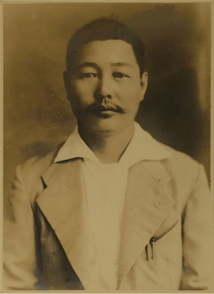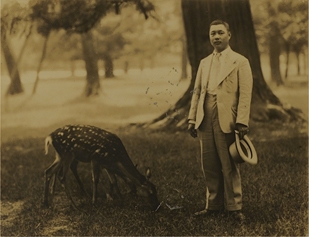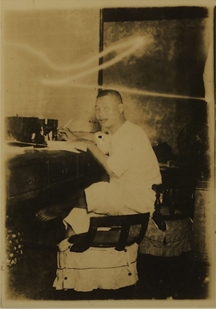 |
Lei Ho was one of the most important writers in the history of Taiwan. Though he published only forty-two works, he left many poems and articles that inspire the nationalism of people of the time, who were dominated by the Japanese colonial government. He also made a great contribution to modern literature, thus is honoured as "The father of Taiwan's new literature."
 |
| Lai He on his trip to Japen on 1941 (http://km.cca.gov.tw/laihe/) |
Born in the inter-period of the Qing Dynasty and the Japanese government, Lei Ho received both old-fashioned education and that of a contemporary one. Therefore, he had not only a modern way of thinking, but also a passion for his own culture. After receiving his M.D., he encountered the New Literature Movement, which was a literal revolution that gradually became a movement that promoted nationalism. Well affected, he decided to inspire the Taiwanese people in a non-revolutionary way. "Literature is a miniature copy of the society," he once said. Through composing essays, poets and novels, he directly described Taiwanese life under the colonial domination of the Japanese, especially the inferior ones. Through this way, he hoped to raise the citizens' eagerness for freedom and nationalism. He had a belief that people in Taiwan should have their own thoughts instead of just following the order of the government, and that as a human, they should not only have physical right but mental rights to think freely. Disliked by the colonial government for his acts, he was imprisoned for protesting movements. He, however, didn't give up writing because of this. He continued to make poems in prison. After being released, he conducted the literature section of Taiwan News, doing his best to elevate the younger generation. The origination of "Protesting Literature" and "Farmer's Literature" were all credited to Lei Ho. His concern for the society, criticism to the old social structure, as well as his sympathy for the common people won him the title of "Lu Xun of Taiwan", who was a great modern writer.
 |
| Lai He in his clinic (http://km.cca.gov.tw/laihe/) |
Furthermore, in addition to spreading the freedom of thought to others through literature, his medical deeds were also greatly praised. Lei Ho was a doctor by profession, and he healed patients wherever he went, whatever the disease was. Like Confucius, a great teacher of ancient China, he left no children behind, he just left no patients behind! Because of this kind of belief, many people were saved by Lei Ho. Nevertheless, he was a doctor, he therefore had to earn a living with it. When encountering needy families who could not pay the fee, he just took out a ledger and recorded, "Mr. Joe, cured by some medicine on some day, total fee some amount." Many of the families hold a great gratitude toward him, for he did not force them to pay the fee immediately, but made it credit. And further burned every one of the ledgers on every New Year. If any of them wanted to pay, Lei Ho would turn them down under every circumstance, and denied the existence of any of the debts.
He died from a heart attack in prison. Lei Ho might not have known that what he had done or what he had preached would last, but his thoughts would continue to live on through every single word he left behind.
Page created on 6/10/2010 12:00:00 AM
Last edited 6/10/2010 12:00:00 AM
